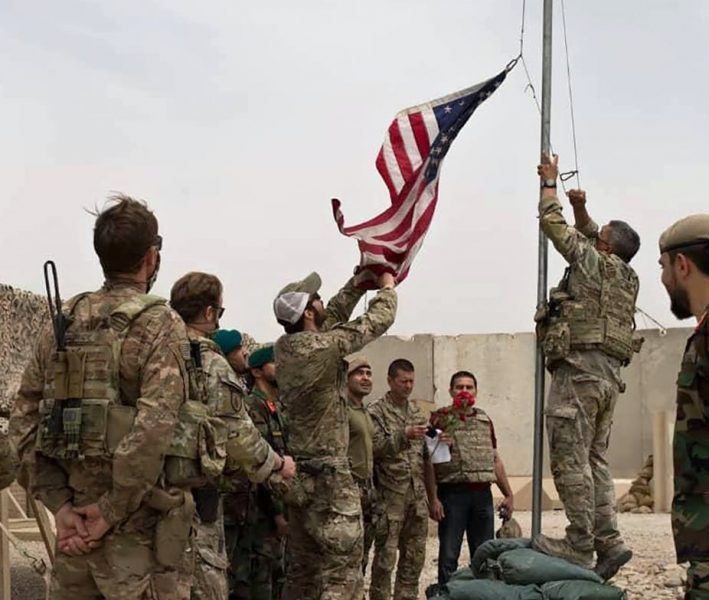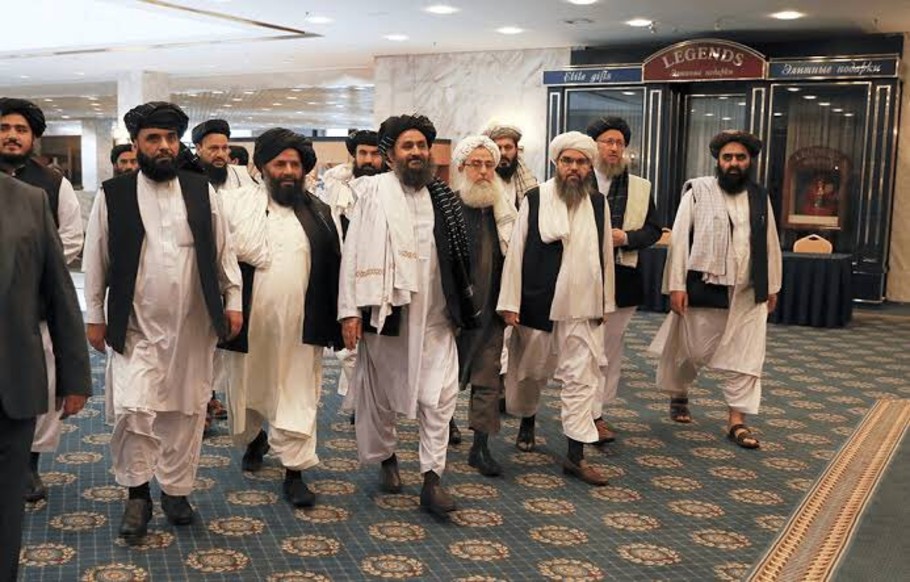
Afghanistan Papers: All about 'Lessons learned,' failures that should not be repeated
The ignorance of the Americans was on many fronts, starting with a basic lack of understanding of the civilization, culture and ways of life that was critical.

Craig Whitlock. THE AFGHANISTAN PAPERS: A SECRET HISTORY OF THE WAR
(Simon and Schuster, 2021, 346 pages)
The Vietnam War went through six American Presidents starting with Harry Truman but the physical involvement of the United States lasted some 18 years and 6 months, leaving about 58,000 soldiers dead and thousands wounded in a conflict that still takes its toll on American society.
The war was of so much central concern to the body politic that no President wanted to go down in history as the one who lost Vietnam to the Communists. The hopelessness of the conflict forced Lyndon Johnson out of the Presidential election in 1968 and Richard Nixon resigned in 1974 as a result of the Watergate scandal that had its genesis in the secret war he had started in Cambodia.
The Pentagon Papers that painstakingly put together the history and decision making during the tortuous conflict essentially had one major point to put across—that successive Presidents lied to the American public that the war could somehow be won, quite contrary to what the men-in-uniform were saying from the battlefronts.
It is not as if the commanders were right on the call every time; they too fell to the temptation of exaggerations and inflated assessments to please their masters at the Pentagon and White House.
And Generals vigorously denied that they had ever said that there was light at the end of the tunnel—many times, the Americans were blissfully ignorant of the tunnels that the Viet Cong and North Vietnamese had dug right under their noses, much less to see any light!
Lessons not learned
The Afghanistan Papers is a cut of a different kind. The conflict in that Central Asian country came some five decades after the Vietnam fiasco and did not have that Cold War label plastered on it. Seen in a different way, the Pentagon Papers were a compendium of memorandums, many of them labelled secret, top secret or for your eyes only messages, that the Nixon administration went to court to protect confidentiality in the name of national security.
In the case of The Afghanistan Papers, an astute investigative reporter of The Washington Post, Craig Whitlock stumbled into a tip that an “obscure” federal agency called the Special Inspector General for Afghanistan Reconstruction (SIGAR) had done many, many interviews with people under a project LESSONS LEARNED that was to highlight the failures that ought not to be repeated.
Also read: Taliban ‘extremely supportive’: Afghan coach Klusener ahead of T20 WC
Not satisfied with the stale or wooden published reports of SIGAR, Whitlock and The Washington Post went to court asking the federal agency to cough up the entire lot.
After a three-year battle, the agency did come up with 2,000 pages and interviews and talking points of more than 400 individuals, a good assortment of military personnel, diplomats, aid workers and Afghans—all of this not before the federal government went into an overdrive of afterthought and going about stamping varying degrees of confidentiality on documents.
Broken down into six parts, the easily readable book’s attempt to capture what went wrong in Afghanistan can be captured in a one-liner of a senior diplomat, Richard Boucher, who was in charge of Central and South Asia during the Bush administration: “WE DID NOT KNOW WHAT WE WERE DOING.”
Whitlock and The Afghanistan Papers capture vividly the scene and the setting in the aftermath of the terrorist attacks of September 11, 2001. The fund of goodwill and sympathy that was generated was simply unbelievable—even the Iranians who had gathered in Teheran were not chanting “Death To America”, apparently.
What next—mess
And President George Bush who barely won the elections of 2000 by a handful of contested votes in Florida saw his popularity soar. The Rallying Around the President continued well past September into October when Bush ordered for a massive show of force with a view to driving the al-Qaeda and the Taliban out of the caves of Tora Bora and Afghanistan as a whole.
A campaign that started in the first week of October had pretty much accomplished its objectives by December, Whitlock points out and after that remained one big question in the minds of diplomats and military commanders: WHAT NEXT?—a question that will haunt not just President Bush but also Presidents Barack Obama and Donald Trump and to a lesser extent Joseph Biden.

No one had a clue including at the White House, Pentagon and the State Department, if the annotations of Lessons Learned are anything to go by. In fact, the al-Qaeda and the Taliban were so pulverized inside Afghanistan and driven into Pakistan that anything could have come about by way of a political settlement at the Bonn Conference in December 2001: the critical omission, as the Papers point out was the deliberate omission of the Taliban, much of it at the insistence of the Northern Alliance.
That not only set the stage for a rocky state of affairs for the next 20 years culminating in Washington repeating a similar mistake in drafting the Doha Accords of 2020—leaving out the Government of Ashraf Ghani as a party to the negotiations. The result: the Taliban refrained from attacking American and NATO forces but went after the government troops substantially weakening them in the provinces prior to the fall of Kabul on August 15, 2021.
Cancer of corruption
Whitlock, drawing on Lessons Learned transcripts, highlights one lesson that the United States did not learn from its debacle in Vietnam—the cancer of corruption and how the political leadership and military generals in South Vietnam lived off the scourge.
In Afghanistan as Whitlock points out, Kleptocracy was the order of the day. Christopher Kolenda, an Army Colonel put it this way: ”Petty corruption is like skin cancer; there are ways to deal with it and you’ll probably be just fine. Corruption within ministries, higher level, is like colon cancer; it’s worse, but if you catch it in time, you’re probably okay. Kleptocracy, however, is like brain cancer; it is fatal.”
And one of the biggest sources of corruption in the Afghan war was the American military supply chain! And in the final days, President Biden’s refrain of the Afghan forces being a first rate force is being laughed out of court—the 300,000 numbers point to a cooked up figure for salary payroll for starters.
Also read: Taliban to change Afghan passports, national identity cards
The ignorance of the Americans was on many fronts, starting with a basic lack of understanding of the civilization, culture and ways of life that was perhaps more critical than expressing bewilderment that Afghans did not know how to use western style potties.
Military commanders, contractors, aid workers and the foreign service officers were many times at a loss to differentiate between the al-Qaeda and the Taliban or between the Arabs and the Pashtuns; and not all of it could be passed off in humor.
Working in cross purposes also took its toll especially when late during the game Washington decided to drop the sledgehammer on narcotics trafficking, only to find many of the dealers were on the payroll or being sympathized by the Central Intelligence Agency (CIA) or Drug Enforcement Authority (DEA). All of which brings up a basic question: Who is the bigger evil? Taliban or the Afghan government?
The purpose
There is one persistent theme that runs across the book and something that the 46th President, Joseph Biden talked about in length at the time of America’s clumsy and lousy pullout process from Afghanistan this August—that the United States was not in the business of Nation Building.
The truth of the matter was that Washington may not have said that in so many words, but it was in this business in Afghanistan, only that it did not know how to go about the process.
Boucher in a 2015 Lessons Learned interview put it this way: “If you look at it after 15 years, we could have taken a thousand (Afghan) schoolchildren in first grade—well, not quite first, but fifth grade—and taken them to get educated and trained in Indian schools and colleges. Then we could have brought them back in an airplane by now and said ‘Okay, you guys run Afghanistan’… Better than having a bunch of Americans going in and saying, ‘We can build it for you’.”
Pakistan’s double role
Through Lessons Learned, Whitlock also highlights the dual role played by Pakistan in Afghanistan—pretending to be cracking down on the al-Qaeda and the Taliban in return for generous handouts from successive American administrations and at the same time giving them protective cover and assistance.
How else can one explain the presence of Osama bin Laden in Abbotabad within spitting distance of a military garrison? But in a candid admission to Ambassador Ryan Crocker, the Head of Pakistan’s Inter Services Intelligence, Lt. Gen. Ashfaq Kayani said categorically: “I know you think we’re hedging our bets, you’re right, we are because one day you’ll be gone again… you’ll be done with us, but we’re still going to be here because we can’t actually move the country. And the last thing we want with all our other problems is to have turned the Taliban into a mortal enemy. So, yes, we’re hedging our bets.”
(The writer was a former senior journalist in Washington DC for about 15 years covering North America and the United Nations.)

